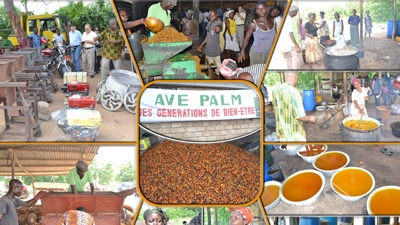ASSAHOUN, November 19, 2013 - In Togo, the oil palm tree is of special importance and the products derived from it, notably, palm oil (extracted from the pulp) and palm kernel oil (extracted from the kernel), are highly valued. Production of these oils has always been the responsibility of women, but the traditional methods used made the work very arduous.
To make the task less strenuous and increase the sector's output, the palm oil production facility AVE PALM, located in Assahoun (about 50 kilometers northwest of Lomé, the capital of Togo), invested in modern equipment.
Through the competitive financing mechanism established by the Ministry of Agriculture under the Agriculture Sector Support Project (PASA), which promotes entrepreneurship and rural employment, AVE PALM was able to acquire new equipment and machinery (presses, crushers, tricycles, pots, etc.), which have not only helped increase palm kernel processing in the villages, but also created new jobs.
"With the different equipment that we have been able to purchase, the work has become much less arduous for the women, and interest in palm oil production has increased significantly in the communities. In the prefecture of Agou alone [where Assahoun is located], for example, palm oil producers have increased from 240 to over 500 at present," said Mr. Agbo, the director and developer of AVE PALM, a company created in 2004. The number of palm kernel oil producers in Assahoun has also risen, from 20 to 44.

